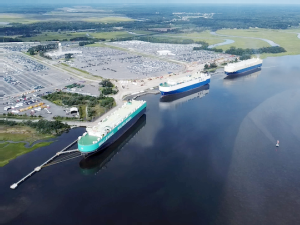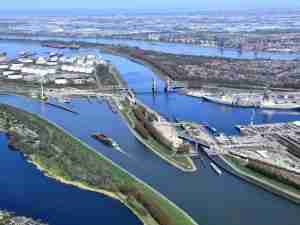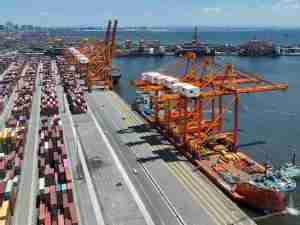- Jobs generated by port-related activity jumped 74 percent to 23.1 million;
- Federal, state and local tax revenues generated by port-sector and importer/exporter revenues rose 51 percent to $321.1 billion; and,
- Personal wages and local consumption related to the port-sector increased from $649 billion to $1.1 trillion, with the average annual salary of those directly employed by port-related businesses equating to $53,723.
America’s ports contributed $4.6 trillion to economy in 2014
posted by AJOT | Apr 30 2015 at 08:38 AM | Ports & Terminals
A new study of United States seaports, including the Port of Indiana-Burns Harbor, found that ports delivered a $4.6 trillion economic impact to the nation's economy in 2014.
An updated report of the benefits that U.S. ports contribute to the prosperity of the nation was released on April 21 at the American Association of Port Authorities' (AAPA) 2015 Spring Conference meeting in Washington, D.C. There, Dr. John Martin, president of Lancaster, Pa.-based Martin Associates, a leading provider of economic and strategic assessments of the world's transportation systems, debuted his firm's 2014 National Economic Impact of the U.S. Coastal Port System. The report showed the contributions of America's seaports in 2014 equaled $4.6 trillion, or more than one-quarter of the country's economy.
In the seven years since Martin Associates' last nationwide ports economic impact study, the contributions of America's seaports to the nation's economy have risen dramatically. While overall economic impacts increased 43 percent, other notable gains since 2007 in Martin Associates' new report include:
"The growth in jobs and economic importance of America's seaports reflects the fact that the value of international cargo handled at these ports increased by $400 billion since 2007, reaching about $1.8 trillion in 2014," said Dr. Martin. "It's important to emphasize that the key growth in our international trade was in U.S. exports, which saw a 60 percent increase in value over the past seven years."
Dr. Martin also emphasized that the robust growth in the economic impact value from U.S. ports occurred despite the economic recession that severely hampered marine cargo activity between 2008 and 2012.
"The Ports of Indiana's three facilities on the Ohio River and Lake Michigan are some of our state's largest economic engines," said Rich Cooper, CEO for the Ports of Indiana. "The significant increases in economic activity reflected in Dr. Martin's most recent study clearly show that ports generate huge economic impact and jobs, and represent the backbone of our economy, as well as our connection to the world and our very quality of life."
Cooper reiterated that the Martin Associates' findings "also show how vitally important it is that investment in our ports and landside transportation infrastructure be a high priority so that the U.S. can remain a global competitor, providing these positive impacts for generations to come."
AAPA President and CEO Kurt Nagle agreed. "The fact is that while over a quarter of the U.S. economy is accounted for by port cargo activity, freight connections to our ports are crumbling, putting our economy at risk and reducing America's competitiveness in global markets."










